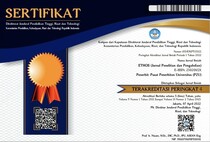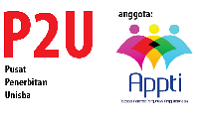Pemberdayaan Keterampilan Mitigasi Banjir Masyarakat Jakarta Melalui Penyuluhan: Kegiatan Pengabdian Saat Pandemik Covid-19
Abstract
Abstract. Flood mitigation is an urgent matter to be carried out during the Coronavirus Disease 2019 (COVID-19). The purpose of this activity was to provide information to the community related to flood mitigation to empower the knowledge and skills of flood disaster mitigation. The method used in this service is counseling and discuss with each other. There were 38 community participants from various regions in Jakarta. This dedication activity is carried out online through the zoom application because during the COVID-19 pandemic period physical distancing was carried out. The results of this activity show that there is an increase in the score of disaster mitigation knowledge and skills after participating in counseling activities. The conclusion of this activity was that the flood mitigation counseling activity succeeded in empowering community disaster mitigation knowledge and skills.
Keywords: COVID-19, disaster mitigation, flooding.
Abstrak. Mitigasi bencana banjir menjadi sebuah hal urgen yang harus dilakukan disaat pandemik Coronavirus Disease 2019 (COVID-19). Tujuan dari kegiatan ini adalah untuk memberikan penyuluhan kepada masyarakat terkait dengan mitigasi banjir untuk memberdayakan pengetahuan dan keterampilan mitigasi bencana banjir. Metode yang digunakan dalam kegiatan pengabdian ini adalah dengan penyuluhan dan tanta jawab. Peserta kegiatan berjumlah 38 orang masyarakat yang berasal dari berbagai wilayah di Jakarta. Kegiatan pengabdian ini dilakukan secara online melalui aplikasi zoom dikarenakan selama masa pandemik COVID-19 untuk dilakukan physical distancing (menjaga jarak). Hasil dari kegiatan ini menunjukan bahwa terjadi peningkatan skor pengetahuan dan keterampilan mitigasi bencana setelah pserta mengikuti kegiatan penyuluhan. Kesimpulan dari kegiatan ini adalah bahwa kegiatan penyuluhan mitigasi banjir berhasil memberdayakan pengetahuan dan keterampilan mitigasi bencana masyarakat.
Kata Kunci: COVID-19, banjir, mitigasi bencana
Keywords
Full Text:
PDFReferences
Ahmad, T. B. T., & Nordin, M. S. (2014). University students’ subjective knowledge of green computing and pro-environmental behavior. International Education Studies, 7(2), 64–74. https://doi.org/10.5539/ies.v7n2p64
Allo, M. D. G. (2020). Is the online learning good in the midst of COVID-19 Pandemic? The case of EFL learners. Jurnal Sinestesia, 10(1), 1–10.
Braun, T., Cottrell, R., & Dierkes, P. (2018). Fostering changes in attitude, knowledge and behavior: demographic variation in environmental education effects. Environmental Education Research, 24(6), 899–920. https://doi.org/10.1080/13504622.2017.1343279
Choudri, B. S., Baawain, M., Al-Sidairi, A., Al-Nadabi, H., & Al-Zeidi, K. (2016). Perception, knowledge and attitude towards environmental issues and management among residents of Al-Suwaiq Wilayat, Sultanate of Oman. International Journal of Sustainable Development and World Ecology, 23(5), 433–440. https://doi.org/10.1080/13504509.2015.1136857
Crawford, J., Butler-Henderson, K., Rudolph, J., & Glowatz, M. (2020). COVID-19: 20 Countries’ Higher Education Intra-Period Digital Pedagogy Responses. Journal of Applied Teaching and Learning (JALT), 3(1), 1–20. https://doi.org/10.37074/jalt.2020.3.1.7
Glynn, S., Taasoobshirazi, G., & Fowler, S. (2007). Analogies: Explanatory tools in web-based science instruction. Educational Technology, 47(5), 45–50.
Ichsan, I. Z., & Rahmayanti, H. (2020). HOTSEP: Revised Anderson’s Taxonomy in environmental learning of COVID-19. European Journal of Educational Research, 9(3), 1257–1265. https://doi.org/10.12973/eu-jer.9.3.1257
Ichsan, I. Z., Rahmayanti, H., Purwanto, A., Sigit, D. V., Irwandani, I., Ali, A., Susilo, S., Kurniawan, E., & Rahman, M. M. (2020). COVID-19 outbreak on environment: Profile of islamic university students in HOTS-AEP-COVID-19 and PEB-COVID-19. Tadris: Jurnal Keguruan Dan Ilmu Tarbiyah, 5(1), 167–178. https://doi.org/10.24042/tadris.v5i1.6283
Kew, S. N., Petsangsri, S., Ratanaolarn, T., & Tasir, Z. (2018). Examining the motivation level of students in e-learning in higher education institution in Thailand: A case study. Education and Information Technologies, 23(6), 2947–2967. https://doi.org/10.1007/s10639-018-9753-z
Lin, T., Guo, X., Zhao, Y., Pan, L., & Xiao, L. (2010). A study of residents’ environmental awareness among communities in a peri-urban area of Xiamen. International Journal of Sustainable Development and World Ecology, 17(4), 285–291. https://doi.org/10.1080/13504509.2010.487995
Lindarto, D., Harisdani, D., & Abdillah, W. (2018). Partisipasi Masyarakat dalam Penggunaan Teknik Biopori untuk Mengendalikan Banjir Kota (Studi Kasus: kelurahan Tanjung Rejo–Medan). NALARs, 17(2), 97–104. https://doi.org/10.24853/nalars.17.2.97-104
Liu, Y., Qu, Y., Lei, Z., & Jia, H. (2017). Understanding the Evolution of Sustainable Consumption Research. Sustainable Development, 25(5), 414–430. https://doi.org/10.1002/sd.1671
Piyapong, J. (2019). Factors Affecting Environmental Activism, Nonactivist Behaviors, and the Private Sphere Green Behaviors of Thai University Students. Education and Urban Society, 001312451987714. https://doi.org/10.1177/0013124519877149
Rahmayanti, H., Maulida, E., & Kamayana, E. (2019). The role of sustainable urban building in industry 4.0. Journal of Physics: Conference Series, 1387(1), 012050. https://doi.org/10.1088/1742-6596/1387/1/012050
Reyna, J., Hanham, J., & Meier, P. (2018). The Internet explosion, digital media principles and implications to communicate effectively in the digital space. E-Learning and Digital Media, 15(1), 36–52. https://doi.org/10.1177/2042753018754361
Reyna, J., Hanham, J., & Meier, P. C. (2019). A framework for digital media literacies for teaching and learning in higher education. E-Learning and Digital Media, 15(4), 176–190. https://doi.org/10.1177/2042753018784952
Sennes, V., Gombert-Courvoisier, S., Ribeyre, F., & Felonneau, M. L. (2012). Citizens’ environmental awareness and responsibility at local level. International Journal of Urban Sustainable Development, 4(2), 186–197. https://doi.org/10.1080/19463138.2012.694819
Shalihati, S. F., Hadi, P., & Widiyastuti, M. (2016). Sistem perdagangan risiko bencana dalam pengelolaan banjir antar-wilayah. Majalah Geografi Indonesia, 24(1), 26–35. https://doi.org/10.22146/mgi.13339
Storr, V. H., Haeffele-Balch, S., & Grube, L. E. (2017). Social capital and social learning after Hurricane Sandy. Review of Austrian Economics, 30(4), 447–467. https://doi.org/10.1007/s11138-016-0362-z
Sutter, D., & Smith, D. J. (2017). Coordination in disaster: Nonprice learning and the allocation of resources after natural disasters. Review of Austrian Economics, 30(4), 469–492. https://doi.org/10.1007/s11138-016-0369-5
Takahashi, B., & Selfa, T. (2015). Predictors of Pro-Environmental Behavior in Rural American Communities. Environment and Behavior, 47(8), 856–876. https://doi.org/10.1177/0013916514521208
Tian, S., Hu, N., Lou, J., Chen, K., Kang, X., Xiang, Z., Chen, H., Wang, D., Liu, N., Liu, D., Chen, G., Zhang, Y., Li, D., Li, J., Lian, H., Niu, S., Zhang, L., & Zhang, J. (2020). Characteristics of COVID-19 infection in Beijing. Journal of Infection, 80(4), 401–406. https://doi.org/10.1016/j.jinf.2020.02.018
Vidergor, H. E. (2018). Effectiveness of the multidimensional curriculum model in developing higher-order thinking skills in elementary and secondary students. The Curriculum Journal, 29(1), 95–115. https://doi.org/10.1080/09585176.2017.1318771
Watson, L., Hegtvedt, K., Johnson, C., Parris, C., & Subramanyam, S. (2017). When legitimacy shapes environmentally responsible behaviors: Considering exposure to university sustainability initiatives. Education Sciences, 7(1), 13. https://doi.org/10.3390/educsci7010013
DOI: https://doi.org/10.29313/ethos.v9i1.6463
Refbacks
- There are currently no refbacks.
Alamat Redaksi:
LPPM Unisba, Lantai 2, Jl. Purnawarman 63, Bandung 40116, Jawa Barat, (022) 4203368 , (022) 4264064. ethos.unisba@gmail.com / ethos@unisba.ac.id

This work is licensed under a Creative Commons Attribution-NonCommercial-ShareAlike 4.0 International License.














